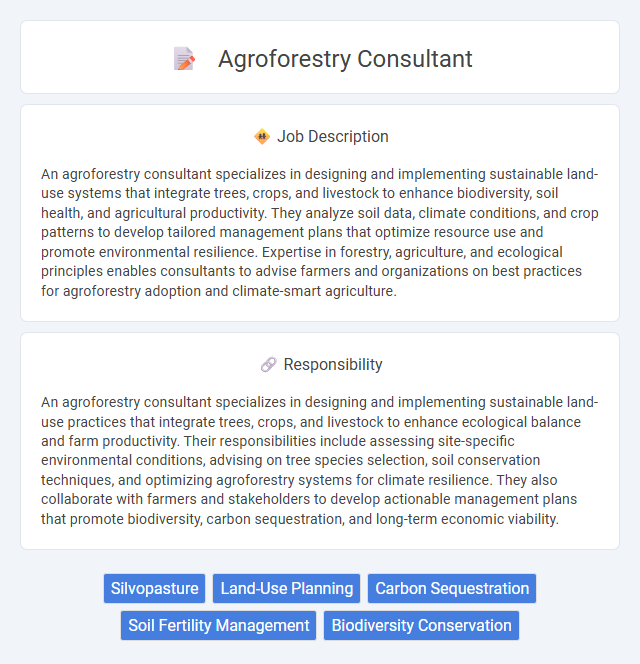
An agroforestry consultant specializes in designing and implementing sustainable land-use systems that integrate trees, crops, and livestock to enhance biodiversity, soil health, and agricultural productivity. They analyze soil data, climate conditions, and crop patterns to develop tailored management plans that optimize resource use and promote environmental resilience. Expertise in forestry, agriculture, and ecological principles enables consultants to advise farmers and organizations on best practices for agroforestry adoption and climate-smart agriculture.
Individuals with a strong background in environmental science, agriculture, or forestry are more likely to find themselves suitable for an agroforestry consultant role. Those who possess excellent problem-solving skills and adaptability may have a higher probability of thriving in dynamic field conditions and working with diverse communities. People who prefer outdoor work and collaborative planning might be better aligned with the demands of this job.
Qualification
An Agroforestry consultant must possess a strong foundation in environmental science, forestry, or agricultural studies, often complemented by a bachelor's or master's degree in these fields. Expertise in sustainable land management, soil conservation, and ecosystem restoration is essential, alongside proficiency in Geographic Information Systems (GIS) and data analysis tools. Strong communication skills enable effective collaboration with farmers, landowners, and policy makers to implement agroforestry practices that enhance biodiversity and increase agricultural productivity.
Responsibility
An agroforestry consultant specializes in designing and implementing sustainable land-use practices that integrate trees, crops, and livestock to enhance ecological balance and farm productivity. Their responsibilities include assessing site-specific environmental conditions, advising on tree species selection, soil conservation techniques, and optimizing agroforestry systems for climate resilience. They also collaborate with farmers and stakeholders to develop actionable management plans that promote biodiversity, carbon sequestration, and long-term economic viability.
Benefit
Working as an agroforestry consultant likely offers significant benefits such as promoting sustainable land use and enhancing biodiversity, which can improve soil health and crop yields over time. This role probably provides opportunities to influence environmental conservation and support farmers in adopting eco-friendly practices, potentially leading to long-term economic and ecological gains. The consultancy position may also offer professional growth through collaboration with agricultural experts and involvement in innovative agroforestry projects.
Challenge
The challenge of an Agroforestry consultant role likely involves balancing ecological sustainability with agricultural productivity to meet client needs effectively. Managing diverse stakeholder interests while integrating complex environmental data might require advanced problem-solving skills. Navigating regulatory frameworks and adapting to climate variability could also present ongoing difficulties in implementing sustainable practices.
Career Advancement
An Agroforestry consultant specializes in integrating trees and shrubs into agricultural landscapes to enhance sustainability and productivity, providing expert advice to farmers and landowners. Career advancement in this field often involves gaining expertise in environmental sustainability, soil science, and land management, moving from entry-level advisory roles to senior consultant or project manager positions. Opportunities for growth expand through collaboration with governmental agencies, research institutions, and private sector clients, enhancing skills in policy development, ecosystem services valuation, and climate-resilient agriculture strategies.
Key Terms
Silvopasture
Agroforestry consultants specializing in silvopasture provide expertise in integrating trees, forage, and livestock to optimize land use and enhance ecosystem services. They analyze soil health, tree species compatibility, and pasture management to develop sustainable silvopasture systems that improve biodiversity, increase carbon sequestration, and boost farm profitability. Key skills include knowledge of silviculture, animal husbandry, and landscape ecology to design resilient agroecosystems.
Land-Use Planning
Agroforestry consultants specializing in land-use planning assess and design sustainable land management systems that integrate trees, crops, and livestock to optimize productivity and ecological balance. They analyze soil quality, topography, and climate data to develop site-specific plans that enhance biodiversity, prevent soil erosion, and improve water retention. Expertise in GIS mapping, environmental regulations, and local agricultural practices is essential for creating effective, resilient agroforestry landscapes.
Carbon Sequestration
An Agroforestry consultant specializing in carbon sequestration designs integrated land-use systems that combine trees, crops, and livestock to maximize carbon capture and storage. They assess soil and vegetation carbon stocks, develop sustainable management practices, and provide data-driven strategies to enhance biomass growth and soil organic carbon. Expertise in carbon markets and environmental policies enables them to guide clients in carbon credit verification and reporting.
Soil Fertility Management
Agroforestry consultants specializing in soil fertility management design sustainable land-use systems that integrate trees and crops to enhance nutrient cycling and improve soil health. They assess soil conditions, recommend organic amendments, and implement practices such as mulching, cover cropping, and nitrogen-fixing species to increase fertility and boost agricultural productivity. Expertise in soil testing, nutrient budgeting, and erosion control is essential to optimize long-term soil nutrient availability and support resilient agroecosystems.
Biodiversity Conservation
Agroforestry consultants specializing in biodiversity conservation develop sustainable land management plans that integrate trees and crops to enhance ecosystem health and wildlife habitats. They assess local flora and fauna, design restoration projects, and recommend practices to increase biodiversity while supporting agricultural productivity. Expertise in ecological principles and soil science enables these consultants to promote habitat connectivity and resilience in farming landscapes.
 kuljobs.com
kuljobs.com